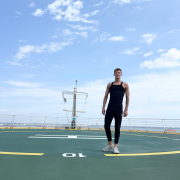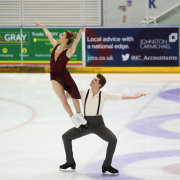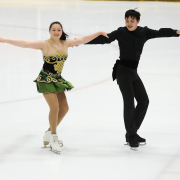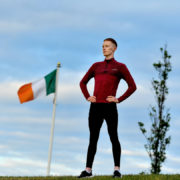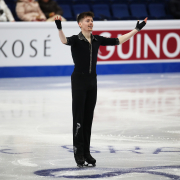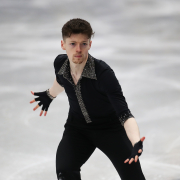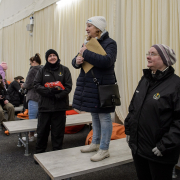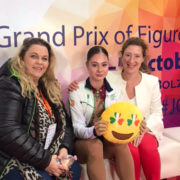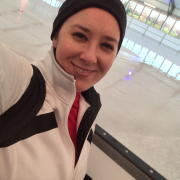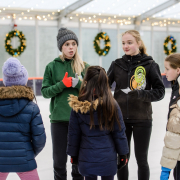Smooth Sailing: Conor Stakelum Embarks on New Career on the High Seas
Following his retirement from international competition in 2022, Irish figure skater Conor Stakelum did not hang up his skates and instead began working in skating shows aboard Royal Caribbean cruise ships. The four-time European competitor talked to us about what life is like as a performer entertaining audiences while sailing from port to port.
What inspired you to become a skater on a cruise ship?
I knew a few skaters who had done it before and the shows looked really good from the clips I had seen. I had also always enjoyed the travelling side of competing and there are a lot of places I want to see so I think it’s a really cool way to travel a lot and also still skate.
What is your favourite part of performing on a cruise ship?
My favourite part is seeing how much the audience is enjoying and appreciating the performances. It is really nice when you get a standing ovation from the audience which actually happens quite a bit because the shows are really good and they are designed really well for the audience. It’s a much more interactive experience than performing while competing which I really enjoy. I also get to enjoy performing much more when I am doing the shows than I was competing because I don’t feel nervous. It’s a much more enjoyable feeling with obviously a different focus.
Can you tell us about a particularly memorable performance or moment on the cruise ship that stands out?
One performance that stands out to me would be the opening night on Oasis of the Seas which is the ship I am on right now because all of our cast got on together and we did rehearsals together on the ship. When we opened the show, it was really nice because we’d all been through the rehearsal process and learning the show and learning our solos and rehearsing, rehearsing, rehearsing and then we finally got to perform for an audience.
How do you stay in shape and maintain your skills while performing on the ship?
We get to practice on the rink on the ship. We always have warm-ups before the shows for half an hour in different groups of three skaters at a time. We practice all our skills before every show and then on other days there is also ice available where we can practice or train if we want to do so. We can also use the gym. It’s a really nice gym and I go there a lot. That’s how I stay in shape and maintain my skills while I am on the ship which is obviously very important because that’s my job.
What advice would you give to someone interested in pursuing a career in figure skating or performing on a cruise ship?
The advice I would give is to work on your skating because the better a skater you are the more chance you have of being hired and also the more enjoyable and easier performing will be for you. For example, you can do a double Axel, but can you do a double Axel in spotlights when you are not really that warm with a heavy costume on and other people really close to you? The more comfortable you are with your skills as a skater, the better you are going to do in any kind of professional setting. That would be my best advice – just work on your skating and be open to new ideas, different styles of music and dance and go for it and apply for things!
What is your favourite destination that you have visited while performing on a cruise ship, and why?
My favourite destination is probably San Juan in Puerto Rico. I found it really beautiful. The old town was absolutely stunning. I hadn’t ever thought of going to San Juan or anywhere like that so I was pleasantly surprised.
How do you collaborate with other performers to create a cohesive show?
During the rehearsal process the whole cast got to know each other quite well. I’ve been very lucky as I have had some really great cast members and we get on really well. You are just always aware of your spacing with other performers, what you are supposed to be doing, on what count of the music everything is supposed to be on because if everyone’s on time and you are all in the right space, the show is going to look good. Just being aware of everybody and getting along well with your cast so that it is enjoyable to perform with other skaters, to create something. When skating is in a competitive environment, it is such an individual sport so it’s really nice to be a team with your cast.
Can you share any behind the scenes insights or secrets about what goes into putting on a successful performance on a cruise ship?
I don’t know if I have any secrets into what goes into putting on a successful performance on a cruise ship, but I would say the most interesting thing is probably when the ship rocks that can be a challenge. You can feel it, but it feels almost as if you are skating up and downhill. You just have to be conscious, especially the pairs teams with their lifts and pairs tricks have got to be careful. All the solo skaters have got to be careful on their jumps obviously because you might land a bit earlier than you were expecting. So, you’ve just got to be prepared for it, but you do get used to it. That would be the biggest challenge and maybe it counts as behind the scenes because you still have to make the show look like the ship isn’t rocking which is definitely a challenge.
What do you enjoy doing in your free time when you are not performing on the ship?
In my free time on and off the ship, I like to explore the ports if I have the chance which mostly I can and see the kind of places where we are. I love to swim in the sea because it is quite warm in the Caribbean. I also like to go to the gym on the ship, even just relaxing on some of the areas of the ship is nice. I pretty much just like to chill out when I am not performing.
Where can people see you perform over the coming months?
For the next few months, I will be aboard Oasis of the Seas between New York, Florida, and the Caribbean.
